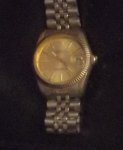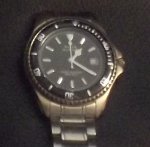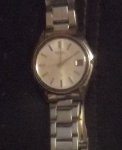tudorsailor
Well-Known Member
If I am going to buy a cheap as chips Casio, is there any particular one that I should hunt for?
TS
TS
That was not the way I read your comment, but hey ho Storm Brendan is stirring up the water.You misunderstand my comment ......
"1nm close inshore is very important ........... offshore is about as important as ??? "
Sun sights run up to noon to create a noon fix is subject to error that can be in miles .... star sights based fix is more accurate. But still subject to error and even in best will of the world - a mile or so out.
My point was 1nm error in position inshore can be disaster whatever means you use for position fix .... but 1nm offshore is not serious. I was not implying that anyone would do astro inshore ......
I have one of their watches that receives the time signal to correct itself every night.If I am going to buy a cheap as chips Casio, is there any particular one that I should hunt for?
TS
I went for one of these, though don't remember it being so dear...If I am going to buy a cheap as chips Casio, is there any particular one that I should hunt for?
TS
If I am going to buy a cheap as chips Casio, is there any particular one that I should hunt for?
TS
I've got a Casio G-Force like this: Casio G-shock Moon/Tide Yacht Watch | Gael Force Marine. Not "cheap as chips", but it keeps good time and has a handy tide indicator - not very precise but useful! Furthermore, if it breaks, I'll have gone before it - it's a lot tougher than I am! The price in the link is a bit too high for it - I got mine in Hong Kong and paid substantially less, and a quick Google search showed much lower prices. Some people have had problems with the strap breaking, but mine has been fine.If I am going to buy a cheap as chips Casio, is there any particular one that I should hunt for?
TS
If you're going blue water sailing, a radio controlled job seems to me to be a waste of money - you'll be out of range of the signal. I wanted a watch with day and date, that I can read in the dark. Modern luminous dials aren't very, and I detest flash stuff with G-SHOCK TERMINATOR or whatever all over it, so after trying several watches, including some at a couple of hundred pounds, I've finally settled on a tenner's worth of end of line Casio from Argos. It claims a 10 year battery life, so it's unlikely to fade out during a voyageIf I am going to buy a cheap as chips Casio, is there any particular one that I should hunt for?
TS




Having thought that I could use my Suunto Core, it is now 2-3 secs out after 6 days
Having thought that I could use my Suunto Core, it is now 2-3 secs out after 6 days. So may be buying a Timex after all
TudorSailor
I had a G-Shock for a while ... till the resin strap caught on a shackles split pin and broke ... lost in Langstone Harbour ... I'm sure the Mullet in LH were very happy to know the time ....
I'm a great believer in simple watches. I have had many with all the buttons and fancy functions. But corrosion soon got at them and half the functions I couldn't select due to crappy buttons.
I have a Seiko Sportsmatic that my father gave me when I was 10yrs old ... slim and special limited edition. I'm now 64yrs old and it still works. But being Automatic - it has an error that changes with temperature climate I am in ... but as a watch and knowing that - its my fav.
For accuracy I have two watches ... an old Avia Divers watch - keeps spot on time and a watch literally same design - Tissot Divers Watch - again keeps spot on time.
I used to have a Seiko 5 auto ... I think about 90% of older Merchant Seaman have had a Seiko 5 at some time .. unfortunately mine got stolen ..... good all rounder plain watch.
Todays quartz watches ... even the cheapest actually keep good time. I have as a back up a QQ watch ... cost me about 15 Euros ... keeps perfect time .. large clear face and hands suits my tired eyes.
I do have a Rolex Datemaster ... I hate it ... face and hands are gold ... so not easy for my eyes to read ... No its not for sale !!
I've collected loads of watches over the years ... but I drift back to that Seiko Sportsmatic and the Avia.
All this talk of accurate time, but, at the risk of a thread drift, is it actually possible to get an accurate sextant reading on a small yacht in a typical sea state when crossing, say, the Atlantic . I ask, because I cannot use binoculars very often in my 31 ft boat, in the Thames estuary above F4 ,even though they have low magnification. That is simply because motion makes it impossible to brace oneself & hold the binoculars level for a few seconds. A sextant seems a total waste of time in a small AWB boat.
I have been through a few Seiko watches over the years. I am hard on watches and have given up wearing them.
Bought in a variety of locations from Botlecks in Rotterdam, Dubai, Abu Dhabi to Taiwan. Usually Damaged,
Eventually resorted to whatever cheep Quartz watch was available.
I a couple of years ago I gave both my boys a Seiko 5 automatic watch. Preference for automatic after having irritating battery issues.
The engineer is hard on his. Replaced two glass. Still runs though.
I used to by those fake rollex watches they were cheep and kept ok time and never bother me much when broken or lost.
I had one with a Stainless fake Rolex with Seiko movement I bought in Taiwan decades ago which kept good time for 30 years.
My son took to wearing it till it eventually died.
I still have my dads stainless 1970 oyster date just but I never wear it for fear of damage or loss. Its sentimental value far greater than actual.
My wife wears a 30 odd year old ladies rollex. It looks nice but it’s never kept time as well as a date just. Or Seiko 5.
My brother still wears a Omega Sea-master I gave him almost 40 years ago which I bought in the old souk in Abu Dhabi. It still keeps time I believe.
I use my cell phone.
I do have a Seiko 5 but I can’t remember where I put it. I did see it the other day. So it’s around somewhere.
So what I am wondering-- is it is pointless worrying about the time if, on a smaller boat, perhaps sub 45 ft, one cannot even take a decent sight with the sextant in the first place?The biggest problem is not the motion ... of course its a serious factor .... but the biggest problem is getting a proper horizon. On a ship - eyelevel is usually anywhere from 40 to 100ft above the waterline and any seas / swell etc. do not obscure the horizon. Imagine a yacht in typical atlantic seas ... half the time the horizon will be obscured ...
If you take a handful of sights and plot them on some graph paper it's easier to see the ones to ignore and get a pretty good sight even if it's a bit choppy. All the errors add up so having accurate time is one less error, well worth it since it's a cheap and easy thing to do.So what I am wondering-- is it is pointless worrying about the time if, on a smaller boat, perhaps sub 45 ft, one cannot even take a decent sight with the sextant in the first place?
So what I am wondering-- is it is pointless worrying about the time if, on a smaller boat, perhaps sub 45 ft, one cannot even take a decent sight with the sextant in the first place?